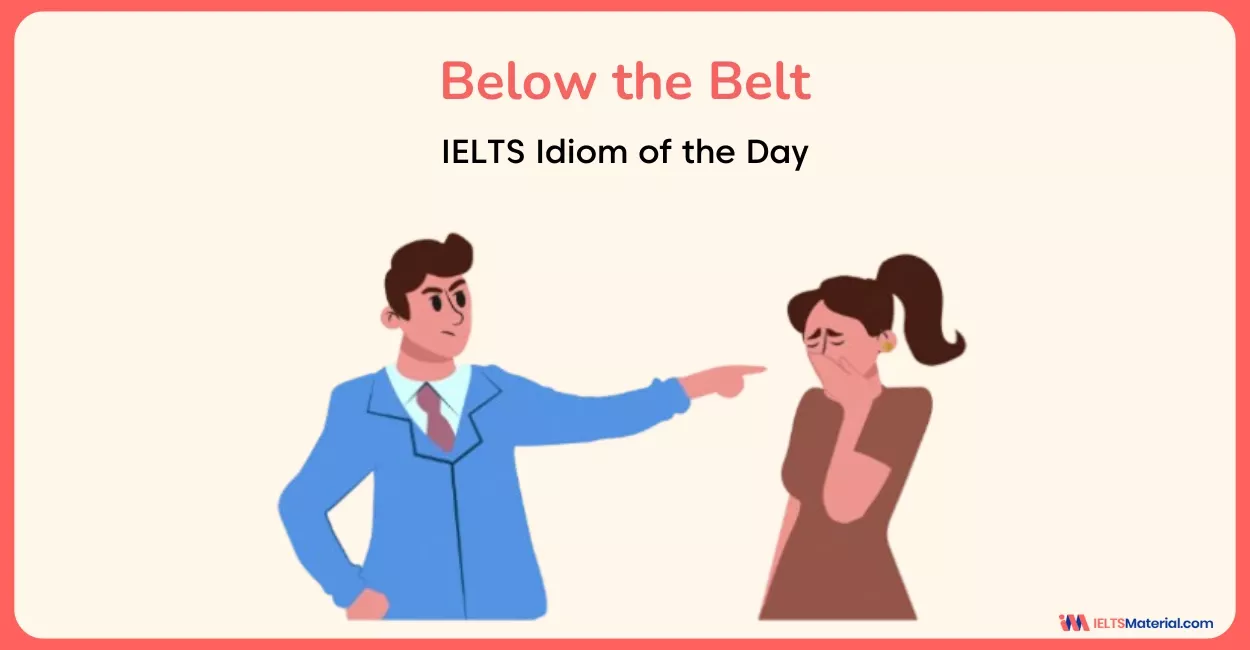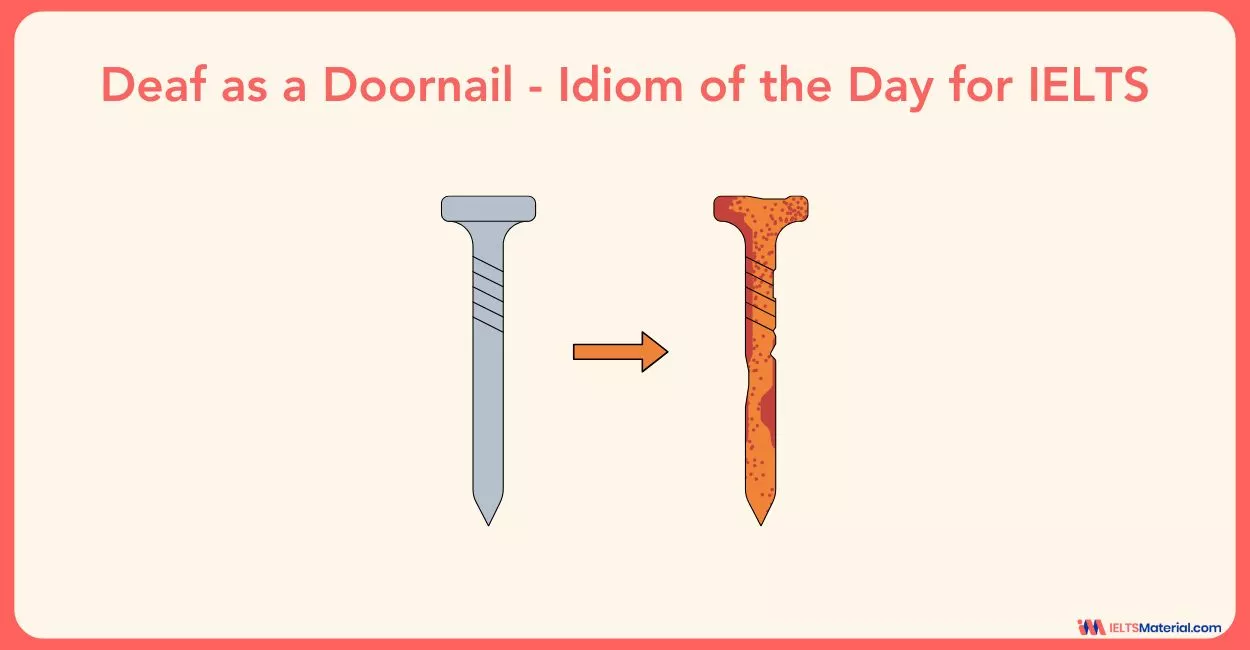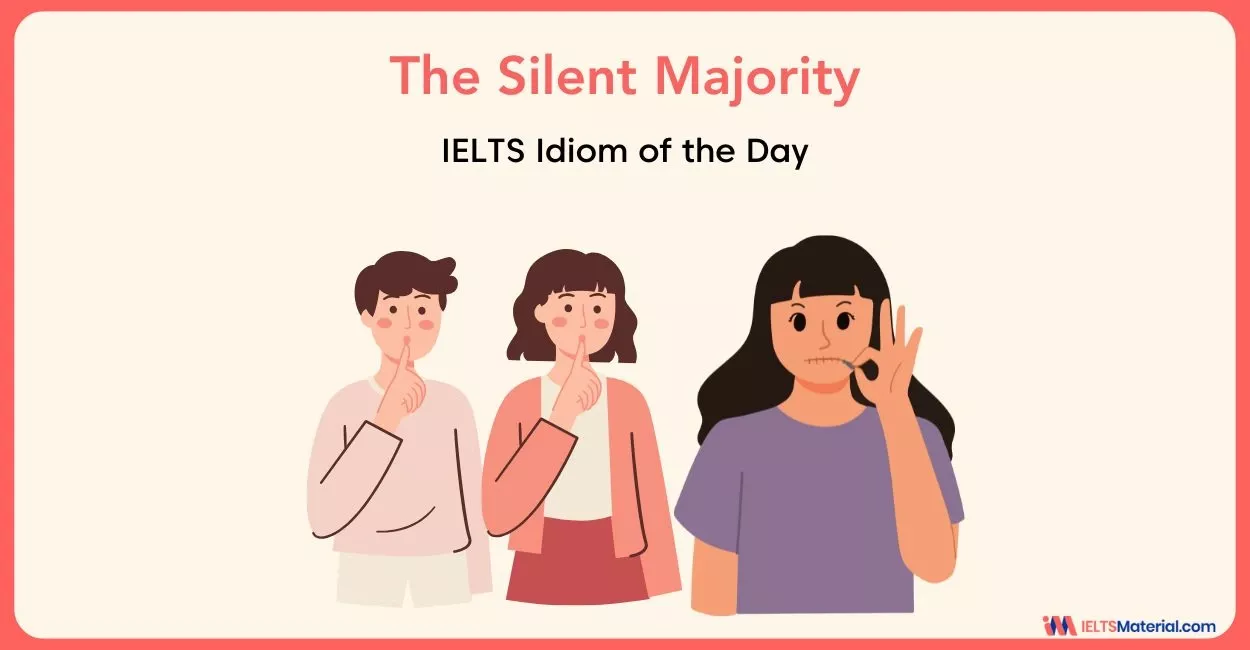The Silent Majority Idiom: Meaning, Origin, Usage & Exercises
The idiom ‘the silent majority’ means ‘a large number of people who do not express their opinion publicly’. Discover the meaning & origin of the idiom, along with examples & exercises created to improve your ability to use it & score 8 and above on IELTS.
Table of Contents

Limited-Time Offer : Access a FREE 10-Day IELTS Study Plan!
In the realm of public opinion and political discourse, one expression that often surfaces in speeches and debates is ‘the silent majority’. For IELTS test-takers, particularly in Speaking and Writing tasks that explore topics like society, government, or protest movements, mastering useful idioms for IELTS Speaking to score band 8.0+ like this one, can give your language a sophisticated edge.
In this blog, we will explore the meaning, origin, and usage of the idiom ‘the silent majority’ and provide examples from the IELTS exam.
To learn more idiomatic expressions, check out the video below for a few more that will help you achieve Band 8 and above.
The Silent Majority Idiom: Meaning
While Oxford defines ‘the silent majority’ as ‘the majority of people, regarded as holding moderate opinions but rarely expressing them’, Cambridge defines it as ‘a group of people who do not express their opinions publicly’.
In simple words, the idiom, the silent majority, refers to a large group of people in a country or group who do not express their opinions publicly, especially those who are not vocal in the media, on social platforms, or in protests, but whose views may strongly influence decisions or elections.
Origin of The Silent Majority Idiom
The term ‘silent majority’ gained political prominence in the late 1960s when U.S. President Richard Nixon used it in a televised address in 1969. He appealed to Americans who were not protesting the Vietnam War, those who supported traditional values but chose not to make their voices heard.
While the phrase existed before, Nixon's use solidified it in global political vocabulary, and it has since been used in social and political analysis around the world.
The Silent Majority Idiom Usage
Given below are some example sentences that show how ‘the silent majority’ idiom can be used appropriately.
- Most parents at the meeting didn’t speak, but the silent majority seemed to support the new school policies.
- Management often ignores the silent majority who never complain but suffer in silence.
- The silent majority often goes unnoticed in media debates, yet their views reflect societal norms.
- Despite widespread online outrage, the silent majority remained supportive of the policy.
- In group projects, the silent majority often avoids conflict but contributes quietly to success.
- It is regrettable that nowadays, more and more young people are becoming the silent majority in policy.
- U.S. Republican presidential candidate Donald Trump frequently references the ‘silent majority’.
- Within a month, the dramatist had joined the silent majority.
Are you looking for expert guidance on vocabulary building for IELTS?
Book an IELTS online class & talk to our experts NOW!
The Silent Majority Idiom: Detailed Usage in IELTS Contexts
Now, it is time to explore how the ‘the silent majority’ idiom can be applied effectively across various IELTS exam contexts, with sample answers tailored to common topics.
IELTS Speaking Part 2
- Cue Card Topic: Describe a time people had different opinions.
- Answer Excerpt: “I remember a university debate on environmental reforms. While the vocal group opposed the changes, the silent majority of students actually supported them but didn’t speak up. In the end, their quiet endorsement helped pass the proposal.”
IELTS Speaking Part 3
- Question: Why do some people hesitate to express their political views?
- Answer Excerpt: “Many people are part of the silent majority; they prefer to avoid public debate or controversy, especially on sensitive topics like religion or politics. While their voices aren't always heard in discussions, their opinions can heavily influence election results or social trends.”
IELTS Writing Task 2
- Topic: Some people believe that vocal protest is the best way to bring about change, while others think staying silent can be just as powerful. Discuss both views and give your opinion.
- Answer Excerpt: Although vocal protest brings attention to a cause, the silent majority often determines the actual direction of change. For example, major democratic decisions are made based on the votes of those who remain quiet until election day.
Boost your IELTS vocabulary and achieve success with our free online webinars.
The Silent Majority Idiom: Practice Exercises
You will find some exercises that will help you improve your understanding and application of the idiom ‘the silent majority’.
Exercise A: Choose the correct option.
1 In which situation does the phrase ‘the silent majority’ most appropriately apply?
A A group of protesters chanting loudly in the streets
B A small committee making decisions behind closed doors
C A large group of citizens who don’t express their opinions publicly but vote in elections
D Social media influencers openly sharing their views on every topic
2 Which sentence uses ‘the silent majority’ incorrectly?
A The silent majority often shapes elections, even if they never attend rallies.
B The silent majority loudly expressed their anger during the protest.
C Although many were vocal on social media, the silent majority remained neutral.
D Politicians often appeal to the silent majority in their campaigns.
3 Why is ‘the silent majority’ important in democratic societies?
A They are the richest segment of the population.
B They dominate all political debates.
C Their quiet opinions can decide election outcomes.
D They have no influence in public matters.
Exercise B: Rewrite the sentences with ‘the silent majority’.
1 Most people didn’t post their opinions online, but they still showed support during the final vote.
2 Although only a few students spoke during the meeting, many others agreed silently.
3 The protest seemed large, but many people quietly disagreed with the message.
The Silent Majority Idiom: Answer Keys for Practice Exercises
|
Exercise A |
Exercise B |
|---|---|
|
1. C 2. B 3. C |
1. Most of the silent majority didn’t post their opinions online, but they still showed support during the final vote. 2. Although only a few students spoke during the meeting, the silent majority agreed with them. 3. The protest seemed large, but the silent majority quietly disagreed with the message. |
Mastering idioms like ‘the silent majority’ is crucial for you if you wish to tackle advanced topics in social, political, or ethical domains. This phrase not only helps you articulate complex ideas clearly but also enhances the richness and fluency of your language. Therefore, along with knowing when and how to use them, you can significantly improve your IELTS vocabulary and sound more like a natural, thoughtful English speaker.
Useful Links:
- Second-Class Citizen Idiom: Meaning, Origin, Usage & Exercises
- The Gift of the Gab – Idiom of the Day for IELTS
- Through and Through - Idiom of the Day for IELTS
- Useful Resources & Websites for IELTS Vocabulary
- The More You Read, The Better You Write: Band 8+ Tip for IELTS Writing
- Mind Maps to Improve Your IELTS Vocabulary
Explore IELTS Resources

Start Preparing for IELTS: Get Your 10-Day Study Plan Today!
Check out other Idioms

Haniya Yashfeen

Haniya Yashfeen
Recent Articles

Kasturika Samanta

Prity Mallick

Nehasri Ravishenbagam







Post your Comments